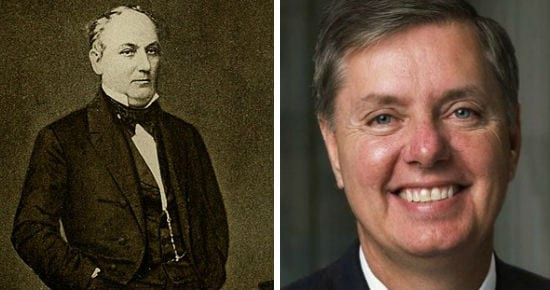Something strange happened last night on the op-ed pages of The New York Times and The Washington Post. I suspect the work of pranksters who somehow hacked into the system.
At the Times these mischief-makers deleted Tom Friedman's column — perhaps the next installment of his "because we could" argument for war on Iraq — replacing it with what appears to be a column by Arianna Huffington.
Over at the Post, meanwhile, the hackers supplanted George Will's next attempt to smear Wesley Clark with an essay that may have been written by Alabama Gov. Bob Riley. Plus they've inserted onto the op-ed page a hilarious parody attributed to "Donald Rumsfeld," in which the supposed Secretary of Defense argues with a straight face that "Today in Iraq we are operating on the same guiding principle that has brought success to our effort in …" get this "… Afghanistan."
If it turns out that hackers aren't actually responsible for all this, then I find myself in the extraordinary position of wanting to commend both Friedman and Will on the same day.
Friedman "connects the dots" between America's military "war on terror" with our leaders' failure to even try to improve the lives of billions of desperately impoverished people around the world. He points in particular to the breakdown in negotiations at the World Trade Organization meetings in Cancun, Mexico.
"I would bet any amount of money," Friedman writes, "that when it came to deciding the Bush team's position at Cancun, no thought was given to its impact on the war on terrorism."
He favorably cites Clyde Prestowitz — author of Rogue Nation: American Unilateralism and the Failure of Good Intentions — and even includes an Arianna-ish rant against "a tax break for any American who wants to buy a gas-guzzling Humvee."
Friedman's thesis is bolstered by another article in the Times, by Thom Shanker:
The United States maintained its dominance in the international arms market last year, especially in sales to developing nations, according to a new congressional report.
The United States was the leader in total worldwide sales in 2002, with about $13.3 billion, or 45.5 percent of global conventional weapons deals, a rise from $12.1 billion in 2001.
We're No. 1 with a bullet — with $13.3 billion worth of bullets, actually. And what better way to ensure international stability than by making sure that every regime with money to spend is armed to the teeth?
Will's column really does read like something by Bob Riley — a conservative, congenitally anti-tax Republican who's been dope-slapped by reality into arguing for adequate, fair taxation in order to fund basic, necessary services such as education.
Will's instinct, like George W. Bush's, is to embrace tax cuts whenever possible. But, unlike the president, Will recognizes a few values other than tax cuts for the wealthy — values such as fiscal responsibility, equality of opportunity, access to decent education and security for the elderly. He doesn't seem to realize how New Deal-ish that list sounds.
Because of values such as these, Nevada Gov. Kenny Guinn pushed through a tax increase to balance his state's budget and keep the schools open. The Bush/Rove/Norquist wing of Guinn's own Republican Party has responded by trying to organize the governor's recall. This exposes a growing fissure in the GOP — the split between the "drown it in a bathtub," anti-government tax-cutters and the fiscal conservatives who believe government has at least some legitimate role to play. By defending Guinn, Will is taking sides in this debate, and he's siding with the grown-ups.
Will maintains his trademark pompous sneer, but for all that he comes across sounding rather like one of those Republicans for Howard Dean. No, really. He even closes with this, from Guinn:
"You can't," Guinn insists, "cut your way to prosperity. … I don't like raising taxes any more than the next person. But I dislike taxes less than I dislike shutting down schools."
Thanks to the Bush administration, this is precisely the choice facing most governors in America today.
As for Rumsfeld, his piece, sadly, is not intended as parody. But it does read that way. He seems to be taking a cue from Winston Churchill, who said he was confident that history would treat him well because, "I intend to write it."
But Churchill had two distinct advantages over Rumsfeld's revisionist attempt at writing history's first draft: 1) Churchill was a talented writer, and 2) he had most of the facts on his side.
Rumsfeld desperately argues that everything in Iraq is going according to plan. Assuming — against all evidence to the contrary — that there ever was a plan, it's simply too much to believe that it outlined the shifting, faltering, flip-flopping policies that the administration has embraced over the past five months.
Rummy even includes an audacious attempt to spin America's failing unilateralism into a more enlightened alternative to the neo-colonial nation-building occurring (far more successfully, by any measure) in Kosovo and East Timor. He actually tries to argue that it would be a bad thing if Baghdad came more to resemble the East Timorese capital. Sure, women can't go outside in Baghdad for fear of being raped or killed, but Diu "is now one of the most expensive cities in Asia" where the cost of "local restaurants are out of reach for most Timorese."
Rather than make Baghdad look like these places, he aims to make it look more like Kabul.
President Clinton recently received a hero's welcome during his visit to Kosovo. The Afghan capital remains far too dangerous a place for President Bush to risk a visit, but if he did go there, does Rumsfeld really imagine he would be warmly received as a liberator?
If we take Rumsfeld at his word — that he has a "plan" to model Iraq on the "successful" nation-building in Afghanistan, what does that mean? Apparently it means he plans to invade some other country next spring to make us forget about Iraq and what a lawless, anarchic failure it has become.












